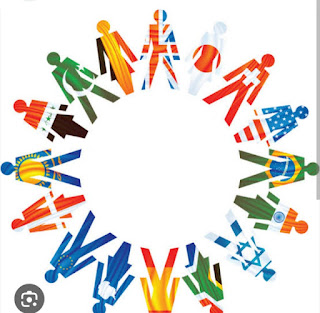MODERN WAYS TO STUDY CULTURE
MODERN WAYS OF STUDYING CULTURE
INTRODUCTION
Studying culture has evolved significantly over time, and in
recent years, new approaches and methods have emerged to analyze and understand
culture in a more nuanced and comprehensive way. In this essay, I will explain various new ways culture
can be studied, focusing on contemporary methodologies and perspective
Culture is a complex concept that which comprises the shared beliefs,
practices, values, and norms of a group of people. Traditionally, cultural
studies have been rooted in anthropology, sociology, and humanities,
emphasizing the examination of cultural practices, artifacts and traditions. Though, as the world becomes
more interconnected and diverse, the study of culture has expanded and accepted
to better capture its dynamic nature through:
1. MEMORY
STUDIES :
Cultural memory studies explore how people remember and commemorate their past.
Memory is a dynamic cultural process, and researchers investigate how
collective memories are constructed, contested, and transmitted through various
means, including monuments, museums, and oral traditions.
2. CULTURES DIGITAL ETHNOGRAPHY AND
ONLINE:
In this digital age, the internet and social media have transformed the
way we interact and express our identities. Digital ethnography is a new way to
the study of culture that involves observing social media platforms, analyzing
online communities and digital spaces. Researchers can gain insights into how
online cultures form, evolve, and interact, revealing the impact of the digital
world on traditional cultural practices.
3. INTERSECTIONALITY: This
acknowledges the interconnected nature of social identities, such as gender,
sexuality, race and class. It has become a vital lens through which culture is
studied or learned. Researchers now
recognize that individuals do not have a single, homogenous cultural identity
but rather exist at the intersections of multiple identities. To this effects,
it highlights the need for considering how various factors shape an individual's
cultural experience.
4. POSTCOLONIALISM AND DECOLONIZATION:
Postcolonial theory has greatly influenced cultural studies by addressing the
legacy of imperialism and colonialism. Cultural researchers increasingly focus
on how colonial histories and power structures have affected contemporary cultures and tradition of the
people. The decolonization movement seeks to challenge and dismantle the
vestiges of colonialism in cultural narratives, practices and institutions
5. MATERIAL CULTURE AND EVERYDAY LIFE:
Material culture studies examine the objects, artifacts, and items that
individuals use in their daily lives.
This approach emphasizes the significant o of the tangible and intangible
aspects of culture and how they reflect individual and collective identities.
6. CULTURAL PRODUCTION AND
CONSUMPTION:
Cultural studies have shifted from merely documenting cultural artifacts to
examining the processes of cultural consumption and production. This includes
analyzing how cultural products, such as film, literature, music and art are
created, marketed, and consumed. It explores how these processes influence
societal values and shape cultural identities.
7. PERFORMANCE AND PERFORMATIVITY: This theory focuses on the idea that culture
is not a static entity but something that people continually perform. It
highlights the ways in which individuals enact their cultural identities through
ceremonies, rituals and everyday behaviours. This approach draws attention to
the performative nature of culture, challenging the idea of fixed identities.
8. VISUAL CULTURE:
Visual culture studies have gained prominence in recent years, focusing on the
role of visual media, such as photography, film, and art, in shaping cultural
meanings and practices. Researchers analyze the impact of visual imagery on
culture, perception, and representation.
9. GLOBALIZATION
AND TRANSNATIONALISM:
The globalization of culture has resulted in a more interconnected world.
Researchers now study how cultural practices and ideas have moved across
borders and adapt to new contexts. The concept of transnationalism acknowledges
that people often maintain multiple cultural affiliations that extend beyond
immediate boundaries.
10. NEUROANTHROPOLOGY AND COGNITIVE
SCIENCE:
The emerging field of neuroanthropology combines anthropology with cognitive
science to understand the relationship between culture and the human brain.
Researchers explore how culture influences perception, cognition and decision-making
processes, shedding light on the neurological underpinnings of cultural phenomena.
CONCLUSION:
At this juncture, it is worth noting that the study of culture has evolved
significantly in recent years and which shows the changing dynamics of the
modern world. These new approaches, from digital ethnography, intersectionality,
neuroanthropology to postcolonialism offer
fresh perspectives on how culture is formed, expressed, and transformed. By
accepting these innovative methodologies, researchers can better understand the
thing that are involve in culture and its impact on our lives and the society
at large. Culture is not static; it is a dynamic and ever-changing force that
shapes our identities and our world, and these new ways of studying culture
help us to understand its complexities in the 21st century even beyond.
https://youtu.be/1RDWDUxA4Cw




Comments
Post a Comment